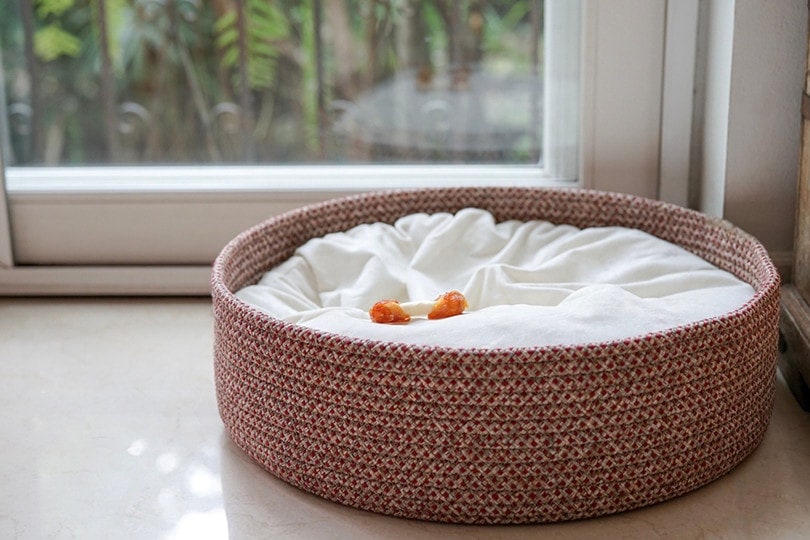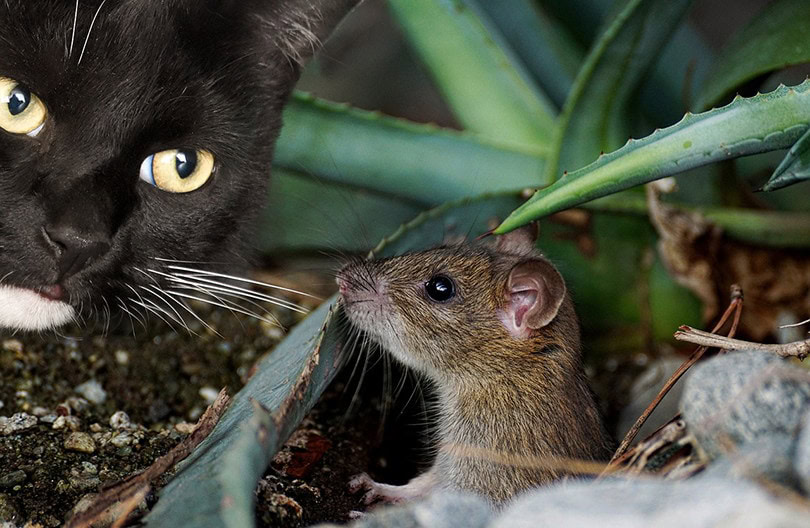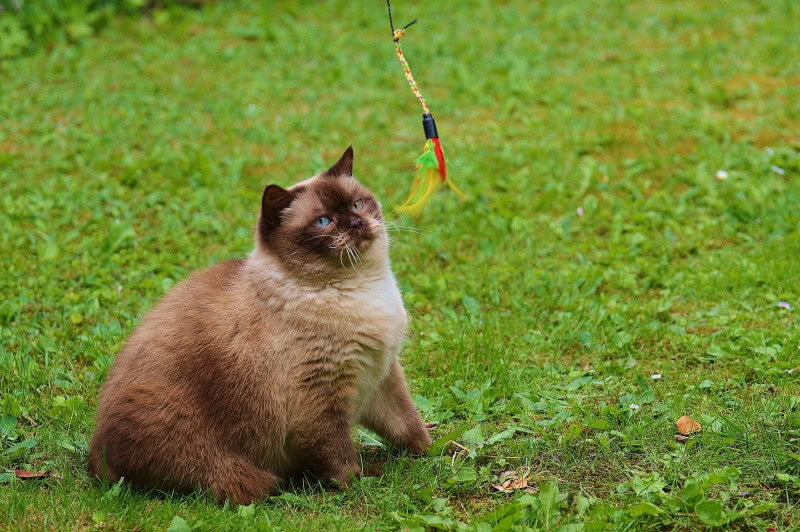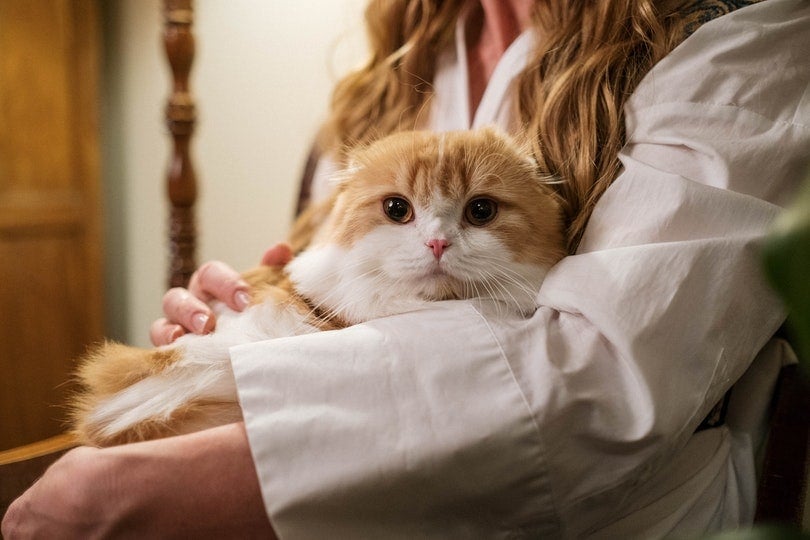VET APPROVED

The information is current and up-to-date in accordance with the latest veterinarian research.
Learn more »Click to Skip Ahead
When you notice your cat peeing outside their litter box, it can be worrying and frustrating. A medical condition could be behind this unusual behavior, and you should always consult with your vet if your cat’s toileting habits change. Added to this, cat pee is notoriously difficult to thoroughly clean. Even with repeated attempts, the odor can remain.
When your cat pees on your dog’s bed, it can be even more confusing. Why would they choose to do this? When cats pee outside of their litter boxes, there is always a reason for this behavior. To get it to stop, you first need to understand why it’s happening.
Let’s examine four reasons that this might be occurring and how you can get it to stop.

The 4 Reasons Your Cat May Pee on Dog Beds
1. Stress
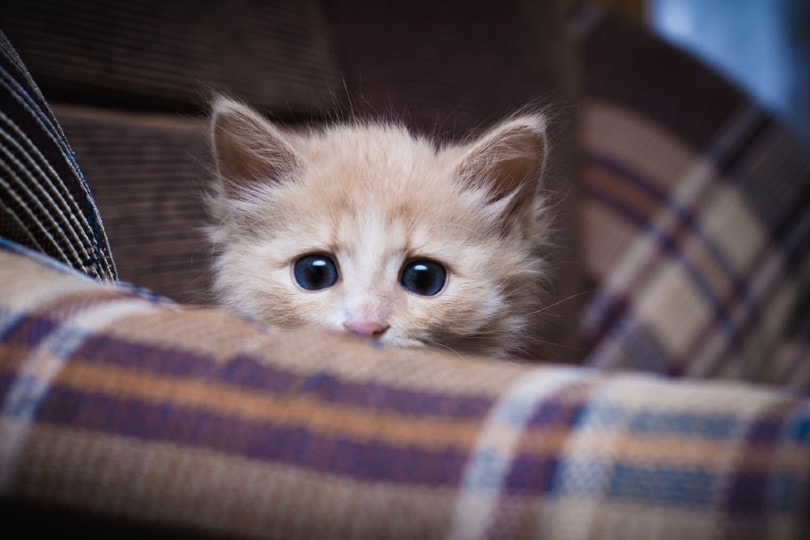
Cats are creatures of habit and routine. Any change in their usual routine can be hard on them, even if the change seems small to you. Some of the most common stressors in cats include:
- Change in the environment
- Conflicts with other cats
- A poor human-cat relationship
- A new person in the household
- A new pet in the household
- Loud noises (thunder, fireworks, etc.)
This list is not comprehensive, but it will give you an idea of the things that may upset your cat. If anything has changed that coordinated with the time that your cat started peeing on the dog’s bed, that might be the cause.
How to Stop It
After you identify the stressor in your cat’s life, you may not be able to do anything to change it. For example, if you’ve recently added a new pet or baby to your home or changed residences, you can’t change things back to how they were before just because your cat is upset. But you can recognize that your cat needs help from their vet and time to get used to a new routine.
Consult with your vet and make a treatment plan. Give your cat a safe place to go that is just their own, that no other pets can access. A tall cat tree, bed, or bedroom that the cat can retreat to and feel safe will help reduce their stress. If the change is related to your time at home or new people in the house, spend extra time with your cat. One-on-one time with them will help reassure them that they are still valued members of the family.
2. Litter Box Issues
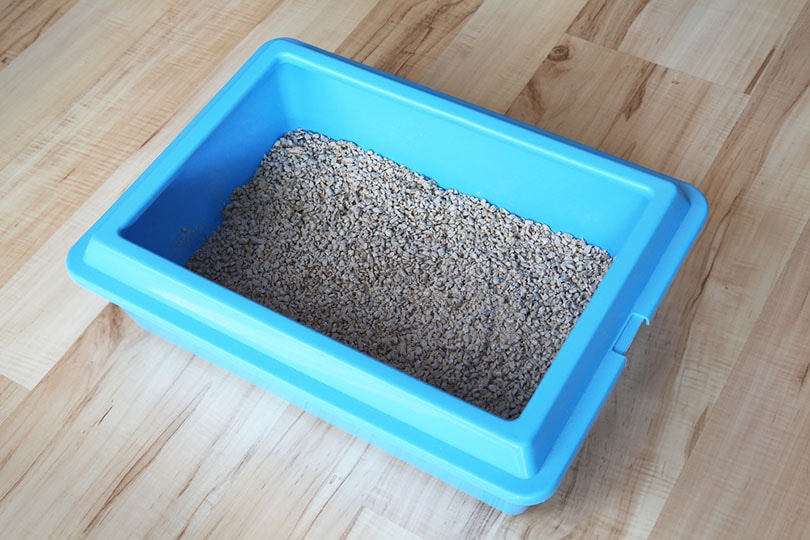
A cat’s litter box is a fundamental part of their care and well-being. Their litter box must be cleaned, with the right amount and type of litter, well located, and private. If the litter box hasn’t been tended to in a while, the cat can show their displeasure with this by peeing on the dog bed. Additionally, cats want their litter boxes to be as private as possible, so the location must be carefully chosen or you can use different litter boxes in varying locations to understand where their preferred spot is. Cats won’t want to use a litter box in a high-activity area. If it’s difficult to reach or your cat doesn’t find it convenient, they may pee on the dog bed because it’s an easier alternative.
The litter box location is important to note. Cats want their litter boxes to be as private as possible. They won’t want to use a litter box in a high-activity area. If it’s difficult to reach or your cat doesn’t find it convenient, they may pee on the dog bed because it’s an easier alternative.
How to Stop It
Scoop the litter box or boxes every day, and be sure to do a complete refresh of them at least every 1–2 weeks. Be sure to put the litter box in a quiet area away from any commotion, and give your cat as much privacy as possible.
If you have more than one cat, you should ideally have one litter box per cat, plus one extra box. This will give your cats options, avoid resource competition, and prevent one litter box from quickly becoming dirty. If you have multiple cats and only one litter box, a simple solution to stopping your cat from peeing on the dog bed may be to just add more boxes around the home.
3. Territory Marking
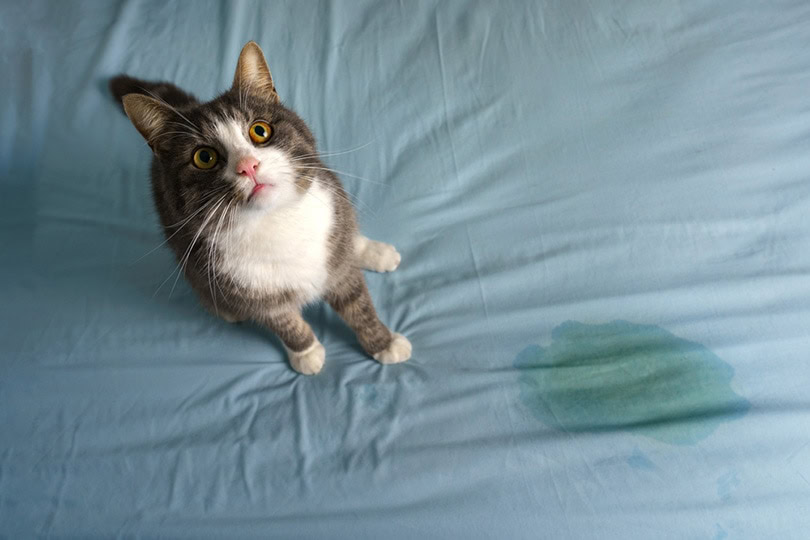
Cats mark their territory in different ways, and one way that they do is by spraying or urine marking. They use urine to communicate with other cats to avoid conflict, to look for a mate, or as a sense of safety or security. This is more common in cats that have not been neutered.
How to Stop It
If you have an intact cat, get them neutered as soon as possible. This may decrease their urge to mark.
4. Health Problems
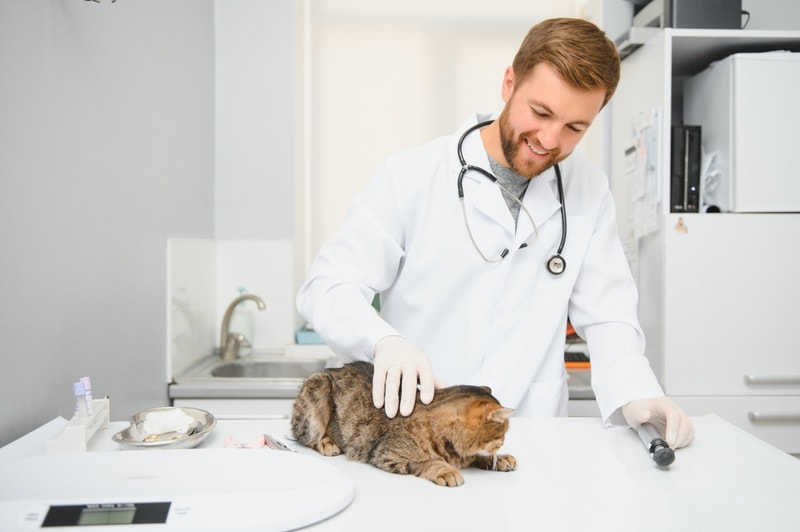
Cats peeing outside of their litter box can be indicative of health issues, some very serious and some less so, but always require a visit to the veterinarian to understand the cause.
Cats that are in pain when they pee in the litter box may start to pee somewhere else. They also may not be able to control their peeing. Does your cat sleep in the dog bed and then leave a wet spot behind? The peeing could be involuntary.
Many things could be the culprit here. Cystitis, urinary tract infections, crystals or stones in the urine, and incontinence are conditions that can cause your cat to pee outside their litter box.
How to Stop It
Consult with a vet as soon as possible. Blood and urine tests will be done, as well as imaging to determine which condition your cat has so your vet can treat it. Medications and a possible change in diet can get your cat feeling better and eliminate their rogue peeing.

Other Ways to Stop This Behavior
If your cat is still peeing on the dog bed and they already got a clean bill of health from the vet, you can try these methods.
Clean the Dog Bed Thoroughly
If your dog’s bed is machine washable, wash it in cold water and hang it to dry. If you can hang it outside in direct sunlight, that will be even better to eliminate odors.
If the bed isn’t machine washable, clean it by using a homemade or enzyme-based commercial cat pee cleaner. You may have to repeat the process to fully eradicate the odor.
It’s important to get rid of the odor as much as you can because if the cat can still smell their pee it can push them to continue urinating there.
Even if you keep a clean and tidy litterbox, you probably still find yourself with cat odors and stains around the house – but with the Hepper Advanced Bio-Enzyme Pet Stain & Odor Eliminator Spray, you can permanently remove even the very worst pet stains and smells! Click here to learn more and get yourself a bottle.
- ADVANCED ENZYMATIC CLEANER - Penetrates the most stubborn smells and stains at the deepest molecular...
- FOR ANY MESS, ON ANY SURFACE - This pet odor eliminator cleans your carpets, floors, furniture,...
- FRESH, NATURAL ODOR - Our unique formulation doesn't rely on dangerous or unpleasant chemical...
At PangoVet, we’ve admired Hepper for many years, and decided to take a controlling ownership interest so that we could benefit from the outstanding products of this cool cat company!
Use Pheromone Diffusers
Cat pheromone diffusers work by by releasing feline pheromones into the air. Pheromones are chemical messengers that cats produce to communicate with each other. Diffusers from trusted brands contain synthetically-made feline facial pheromones, those released to reduce stress and provide a sense of security and comfort. If the reason behind your cat’s behavior is linked to stress, this can be an effective way to calm them down and get rid of this frustrating pattern.
Move the Dog Bed
Your cat could be peeing on the dog bed because it makes a good urinating spot due to its location. Try moving it to another location or blocking your cat’s access to it completely.

Conclusion
Cat pee on the dog bed can be worrying, frustrating, and difficult to clean. If this is new behavior for your cat, try to figure out what the issue is. If they’re stressed, sick, or acting out, contacting your vet and following these suggested methods can help you get your cat feeling better and keep your dog’s bed pee-free. We hope that these ideas have helped you understand more about your cat’s behavior.
See also:
- Why Does My Cat Pee in the Bathtub? Possible Causes
- How to Get Rid of Cat Urine Smells in a Basement
- Why Does My Cat Drink and Pee So Much? Potential Causes
Featured Image Credit: Jareerat, Shutterstock
